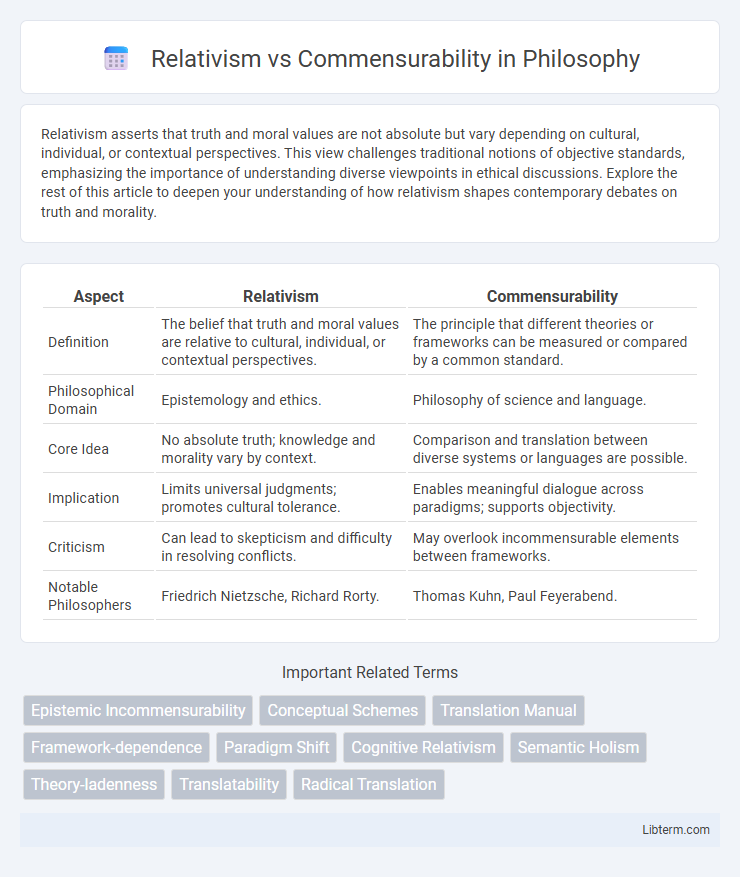Relativism asserts that truth and moral values are not absolute but vary depending on cultural, individual, or contextual perspectives. This view challenges traditional notions of objective standards, emphasizing the importance of understanding diverse viewpoints in ethical discussions. Explore the rest of this article to deepen your understanding of how relativism shapes contemporary debates on truth and morality.
Table of Comparison
| Aspect | Relativism | Commensurability |
|---|---|---|
| Definition | The belief that truth and moral values are relative to cultural, individual, or contextual perspectives. | The principle that different theories or frameworks can be measured or compared by a common standard. |
| Philosophical Domain | Epistemology and ethics. | Philosophy of science and language. |
| Core Idea | No absolute truth; knowledge and morality vary by context. | Comparison and translation between diverse systems or languages are possible. |
| Implication | Limits universal judgments; promotes cultural tolerance. | Enables meaningful dialogue across paradigms; supports objectivity. |
| Criticism | Can lead to skepticism and difficulty in resolving conflicts. | May overlook incommensurable elements between frameworks. |
| Notable Philosophers | Friedrich Nietzsche, Richard Rorty. | Thomas Kuhn, Paul Feyerabend. |
Introduction to Relativism and Commensurability
Relativism posits that truth, morality, and cultural norms are context-dependent, varying across different societies and historical periods without universal standards. Commensurability, by contrast, involves the ability to compare and measure different theories, values, or perspectives using a common standard or framework. Understanding the interplay between relativism and commensurability is crucial in fields like epistemology, ethics, and intercultural communication, where determining compatibility or equivalence between divergent viewpoints impacts dialogue and analysis.
Defining Relativism: Philosophical Foundations
Relativism asserts that truth and moral values are not absolute but depend on cultural, historical, or personal contexts, challenging the existence of universal standards. Philosophical foundations trace back to ancient sophists and are shaped by epistemological skepticism, highlighting the variability of knowledge across different frameworks. This standpoint contrasts with commensurability, which assumes that different value systems or truths can be measured by a common standard.
Understanding Commensurability: Key Concepts
Commensurability refers to the ability to measure or compare different values, beliefs, or perspectives using a common standard or criterion. Key concepts include finding a shared framework for evaluation, ensuring meaningful dialogue between diverse worldviews, and addressing conflicts through agreed-upon metrics. Understanding commensurability helps bridge gaps inherent in relativism, allowing for constructive comparison without dismissing cultural or contextual differences.
Historical Context: Origins of the Debate
Relativism and commensurability emerged as central themes in 20th-century philosophy and social sciences, rooted in debates over cultural diversity and scientific paradigms. The origins of this debate trace back to early anthropological studies and Thomas Kuhn's 1962 work on scientific revolutions, which challenged the idea of universal scientific truth. Historical contexts such as post-colonialism and linguistic anthropology further fueled discussions on whether cultural values and knowledge systems are inherently incommensurable or can be critically compared.
Relativism in Epistemology and Ethics
Relativism in epistemology asserts that knowledge and truth are context-dependent, varying across cultures and social frameworks without absolute standards. Ethical relativism holds that moral principles are grounded in cultural or individual perspectives, denying universal moral norms. Both forms challenge the notion of objective, fixed criteria, emphasizing the variability and plurality of human understanding and values.
Criteria for Commensurability: Language, Logic, and Meaning
Criteria for commensurability hinge on shared language, logical frameworks, and meaning structures that enable comparison across different perspectives. Language serves as a common medium facilitating communication, while logic provides consistent rules for reasoning and inference. Meaning ensures that concepts and propositions maintain equivalence, allowing coherent evaluation and contrast despite diverse cultural or epistemic backgrounds.
Major Thought Leaders: Kuhn, Feyerabend, and Beyond
Thomas Kuhn's concept of paradigm shifts emphasizes the incommensurability of scientific theories, suggesting that competing paradigms are often incomparable due to differing standards and terminologies. Paul Feyerabend further critiques scientific uniformity by advocating epistemological anarchism, arguing that rigid methodologies limit the growth of knowledge and that scientific progress involves a plurality of approaches beyond commensurability. Contemporary scholars expand on these ideas by exploring hybrid models that seek partial commensurability, aiming to reconcile relativist critiques with a coherent understanding of scientific rationality.
Arguments For and Against Relativism
Relativism argues that truth and morality are context-dependent, varying across cultures and individuals without absolute standards. Critics contend that relativism undermines objective knowledge and universal ethical principles, leading to potential contradictions and moral nihilism. Proponents emphasize cultural sensitivity and pluralism, while opponents highlight the necessity of common frameworks for dialogue and accountability.
Implications for Science, Culture, and Communication
Relativism challenges absolute truths by emphasizing context-dependent perspectives, which complicates scientific objectivity and undermines universal cultural norms. Commensurability offers a framework for comparing disparate belief systems, facilitating cross-cultural dialogue and advancing cooperative scientific inquiry. Balancing relativism and commensurability promotes effective communication, enabling diverse societies to engage in meaningful exchange while preserving epistemic standards in science.
Conclusion: Navigating Between Relativism and Commensurability
Navigating between relativism and commensurability requires acknowledging the validity of multiple perspectives while seeking common frameworks for meaningful comparison. Emphasizing context-sensitive criteria allows for adaptive evaluation without dismissing cross-cultural or interdisciplinary dialogue. This balanced approach fosters understanding and cooperation across differing value systems and knowledge domains.
Relativism Infographic

 libterm.com
libterm.com